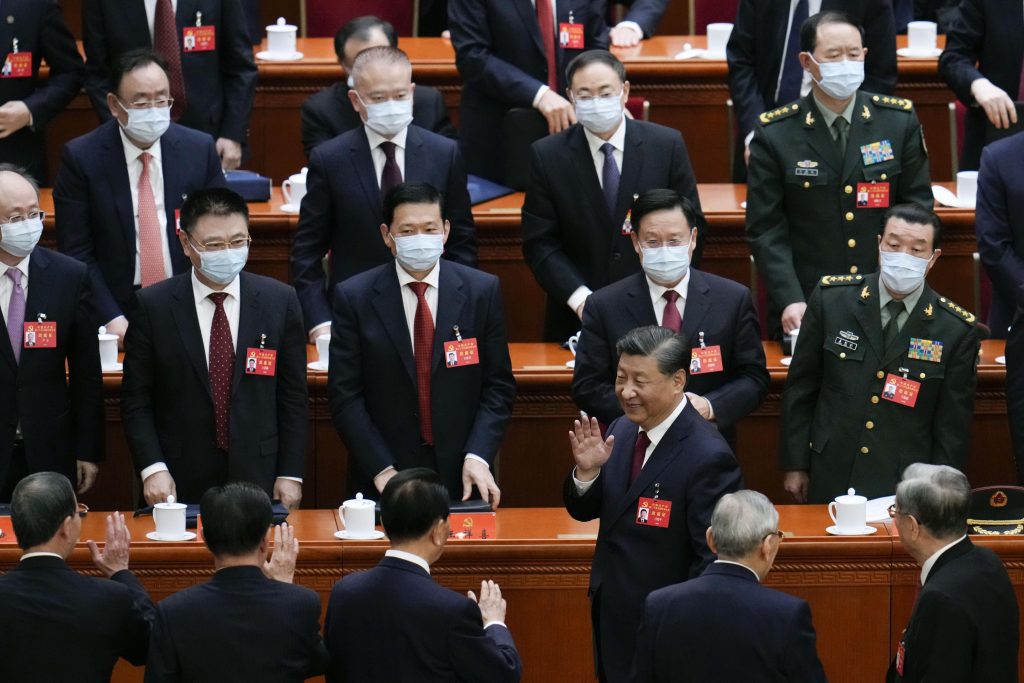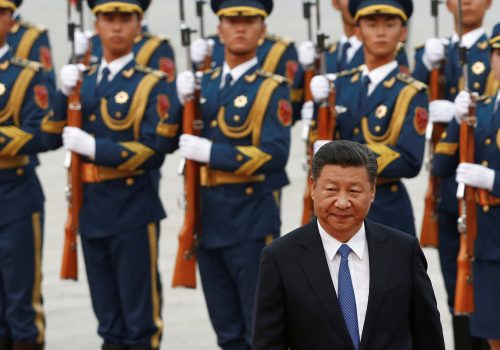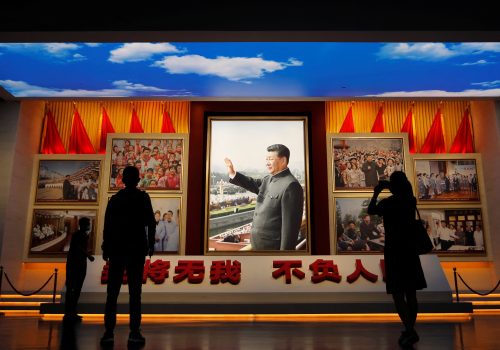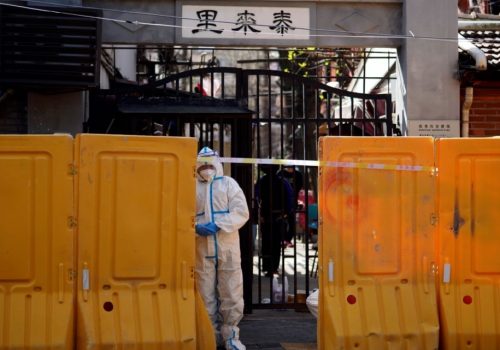GET UP TO SPEED
He’s staying the course. Chinese leader Xi Jinping kicked off the Twentieth Chinese Communist Party Congress—where he’s expected to be handed a third five-year term as party general secretary—with a nearly two-hour speech that emphasized security above other issues facing the country. Xi doubled down on his zero-COVID policy and held out the prospect of forceful “reunification” with Taiwan. How should the world interpret his rhetoric about the island? Is a course correction coming on the economy? What was conspicuously absent from the speech? The Atlantic Council’s China watchers read between the lines for the answers.
TODAY’S EXPERT REACTION COURTESY OF
- Shirley Martey Hargis (@ShirleyMHargis): Nonresident fellow at the Global China Hub and Digital Forensic Research Lab
- Kit Conklin: Nonresident senior fellow at the GeoTech Center and former US national-security official
- Dexter Tiff Roberts (@dtiffroberts): Senior fellow at the Scowcroft Center’s Asia Security Initiative and former China bureau chief for Bloomberg Businessweek
- Jeremy Mark (@jedmark888): Nonresident senior fellow at the GeoEconomics Center and former IMF official and Asian Wall Street Journal correspondent
Strait shooter?
- Tensions in the Taiwan Strait have been soaring in recent months—particularly following US House Speaker Nancy Pelosi’s visit in August. But Shirley assesses that Xi, by using familiar rhetoric around protecting the one-China principle and castigating “outside forces” seeking to influence the island, “is not signaling any greater sense of urgency over Taiwan.”
- “There is no imminent threat from China to take Taiwan militarily,” Shirley adds.
- But Kit sees “an increasingly bold and aggressive Chinese foreign policy” in the speech. “Xi’s refusal to ‘renounce the use of force’ leaves little room for strategic ambiguity when it comes to China’s willingness to go to war with the United States over Taiwan,” he adds.
- China’s leader, Shirley notes, is keenly aware of Taiwan’s growing global acclaim for its handling of COVID-19 and “mastery” of semiconductor production. “Xi wants to temper those accomplishments as much as possible to keep other powers from aligning with Taiwan,” she says. So “it is wise to keep a close eye on more than just military movements: Watch cyberspace and China’s daily use of psychological warfare, legal warfare, and public-opinion warfare against Taiwan.”
Ignorance isn’t bliss
- China’s once-roaring economic growth has hit a snag, but Tiff says the speech signals that “economic priorities for China look broadly unchanged, with no major shifts in direction.”
- That’s bad news for China’s economy, Jeremy tells us, because Xi did not give his comrades a way out of the doldrums of the past two years. “He gave no ground on the zero-COVID policies that have squelched domestic consumption and destroyed small businesses,” Jeremy says. “There was no mention of soaring youth unemployment, which hovers near 20 percent in China’s cities. And he offered no hint of concerted policies that could ease the country’s deep property downturn and prevent that crisis from damaging the banking system.”
- Ignoring those woes, Jeremy adds, will undermine Xi’s own goals of more “domestic demand-driven growth and higher, technology-driven productivity,” not to mention his attempt to close the gap between China’s haves and have-nots: “It will be hard to divide the economic pie more evenly if it’s not growing.”
Tech bro
- Kit points to Xi’s calls to “resolutely win key core technology battles” and “modernize military weapons.” Those comments indicate the Chinese leader’s belief “that science and technology innovation is a key enabler for China’s broader political objectives, including economic growth, military modernization, and Taiwan reunification,” Kit says.
- But Tiff notes that those technology goals are “facing tremendous pressure from US-led sanctions,” which is part of the reason why Xi is making security at home and abroad an issue “of paramount importance.”
- “Beijing continues to be deeply concerned about its fractured relations with the world,” Tiff adds. “As Xi stated in his speech, while China’s global power has increased, it is also facing an unstable international environment and must be prepared for ‘strong winds and high waves and even dangerous storms.’”
Further reading
Tue, Oct 11, 2022
Your expert guide to China’s 20th Party Congress
New Atlanticist By
The once-in-five-years event is slated not only to further cement Xi Jinping's rule but also to have impact on a number of policy areas, from China's economy to its relationship with the Global South.
Fri, Oct 7, 2022
What Xi Jinping’s third term means for the world
Issue Brief By Michael Schuman
It has been widely believed for some time, both inside and outside of China, that current Communist Party General Secretary Xi Jinping will break with modern precedent and extend his reign into a third, five-year term. Xi, who also serves as the country’s president, has been working toward this outcome for years.
Wed, May 11, 2022
China’s faltering “zero COVID” policy: Politics in command, economy in reverse
Report By Jeremy Mark, Michael Schuman
Could Beijing's doubling down on the "zero COVID" policy undermine the narrative of China’s superiority in responding to the pandemic—and the image and stature of Xi’s rule?
Image: Chinese President Xi Jinping (bottom, facing camera) waves as he leaves after attending the opening ceremony of the 20th National Congress of the Chinese Communist Party on Oct. 16, 2022, at the Great Hall of the People in Beijing. (Kyodo) ==Kyodo NO USE JAPAN



